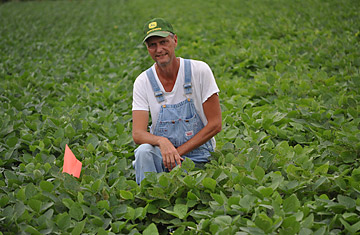
Kip Cullers, who holds the world record in soybean production, amid this year's test plots on his farm in Stark, City, Mo.
(2 of 2)
"It's the long-term solution to feeding the world," the association's executive director Dale Ludwig said, noting that world population is projected to grow 50% by 2050. "If we're going to grow 50% more food on the same number of acres, we have to do something different."
Cullers is battling inertia and reluctance to change, said Ludwig. Farmers "have been doing it one way and making money, and some just don't want to change."
Yet interest in Cullers is high; one rural magazine dubbed him the "Bon Jovi" of agriculture. He travels to Brazil to work with farmers there and has — reluctantly — joined the American agriculture speaking circuit, at the urging of a Pioneer executive. After he won his first world record, Cullers was inclined to stay home with his beans, but the executive pointed out that Cullers lives near Branson, Mo., the Ozarks music-and-lake playground that is among the nation's biggest tourist attractions.
"All of a sudden it becomes a tax deduction," he warned Cullers about the army of farmers likely to come calling on their way to or from a holiday. Sure enough, farmers began showing up unannounced at Cullers' front door, so the soybean rock star took to the circuit.
Cullers is open and friendly, but you get the feeling a few bits of his secret sauce are staying secret. Last year's winning strategies included a fungicide that attacks white mold spores underground; a seed treatment of rhizobia bacteria to promote root growth; and "burning off" the tops of his soybean plants early in their development with nitrogen, crop oil and a herbicide. The plants looked dead for two weeks, but then came roaring back.
"It's like cutting a tree to get the branches to spread out," he says. "I've done experiments with scissors, too… we cut the tops out, it causes more lateral branches" and compresses the stem length between budding leaves. "You want to stack 'em real tight so they're only an inch apart instead of four inches apart," Cullers advises.
Another competitive advantage Cullers has it that he irrigates differently from a lot of farmers — he tends to give his soybeans a quick spritz in the heat of the day to get the canopy some relief instead of waiting until they're parched. He usually adds sugar to the water three times a season, to promote microbe activity, which "chews at organic matter down in the soil" and helps increase carbon dioxide levels, he says.
Think like a soybean, Cullers tells himself, recounting the time a friend asked for his advice after noticing 250 aphids per plant, but wasn't sure he should spray. Not all agronomists would recommend hitting the plants with pesticide at that stage of the game.
"I said ''My gosh yes!' I always look at it like, if I'm a plant, how would I feel? Would I like it if I had, say, 250 lice sucking on me?" says Cullers.
A devout Baptist and family man, he gets up about 4 a.m. each day to catch up on emails and read commodity news online. Then he's out walking his fields by 5 a.m. "The harder I work the luckier I get," he says. Cullers logs as many as 9,000 minutes a month on his cell phone, talking with plant experts at Pioneer, John Deere and other agri-giants he works with.
The son of a dairy farmer, "you couldn't pay me a million dollars a year now to milk cows," Cullers says. But he always loved vegetables and when he first started farming, he tinkered with his 5,000 acres of green beans to see how far he could push that envelope. "But nobody wants to eat a green bean the size of a banana," he says, so he turned his "mad science" to corn and soybeans.
He keeps his antennae up for what organic farmers are doing, and incorporates some of that movement's "great ideas," such as using humetes, an organic fertilizer. But he's adamant that weed killer and pesticides add productivity while doing no harm.
"I'm always telling people, you know guys, we're not growing this on the moon. And until we learn how to develop the moon, we have to raise as much as we can because we've got a growing, growing population."
But Cullers is walking a fine line, because the man who would like to solve world hunger is also, at day's end, a farmer trying to make a living. God forbid everyone mastered his secrets. "Can you imagine if everyone grew 160 bushels an acre? Prices would crash, they couldn't build ethanol plants fast enough to catch up. There'd be soybeans piled up on every street corner in Iowa!"
